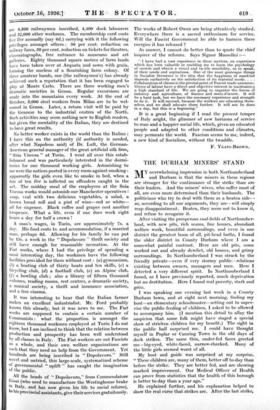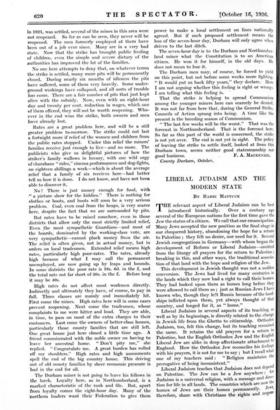THE DURHAM MINERS' STAND
MY overwhelming impression in both Northumberland and Durham is that the miners in these regions are stronger for the continuance of the strike than are their leaders. And the miners' wives, who suffer most of all, are even more determined than their husbands. The politicians who try to deal with them as a beaten side— as, according to all our arguments, they are—will simply reap disappointment. Beaten, they seem not to know it, and refuse to recognize it.
After visiting the prosperous coal-fields of Northumber- land, with new pits, rich seams, fine houses, abundant welfare work, beautiful surroundings, and even in one district the greatest boon of all, pit-head baths, I found the older district in County Durham where I am a somewhat painful contrast. Here are old pits, some worked out and already derelict, old houses, and grimy surroundings. In Northumberland I was struck by the friendly private—even if very stormy public--relations existing between owners, managers and men. Here I detected a very different spirit. In Northumberland I found, as I have previously reported, much deprivation but no destitution. Here I found real poverty, stark and grim.
I was speaking one evening last week in a County Durham town, and at eight next morning, finding my host—an elementary schoolmaster—setting out to super- vise the public feeding of children, I asked to be allowed to accompany him. (I mention this detail to allay the suspicion that some folk might have staged a special show of stricken children for my benefit.) The sight in the public hall surprised me. I could have thought myself in Poplar or Canning Town in the old days of dock strikes. The same thin, under-fed faces greeted me—big-eyed, white-faced, narrow-cheeked. Many of the little girls seemed worst of all. My host and guide was surprised at my surprise. " These children are, many of them, better off to-day than before the strike. They are better fed, and are showing marked improvement. Our Medical Officer of Health can prove from statistics that the health of this borough is better to-day than a year ago."
He explained further, and his explanation helped to show the real curse that strikes are. After the last strike, in 1921, was settled, several of the mines in this area were not reopened. So far as can be seen, they never will be reopened. The men formerly employed at them have been out of a job ever since. Many are in a very bad state. Now that the strike has brought public feeding of children, even the simple and severe dietary of the authorities has improved the lot of the families.
No one here attempts to deny that, on whatever terms the strike is settled, many more pits will be permanently closed. During nearly six months of idleness the pits have suffered, some of them very heavily. Some under- ground workings have collapsed, and all sorts of trouble has come. There are a fair number of pits that just kept alive with the subsidy. Now, even with an eight-hour day and twenty per cent. reduction in wages, which one of them offered, they will not be worth reopening. Who- ever in the end wins the strike, both owners and men have already lost.
Rates are a great problem here, and will be a still greater problem to-morrow. The strike could not last a fortnight more if relief of the women-and children from the public rates stopped. Under this relief the miners' families receive just enough to live—and no more. The publicists who give us delightful pictures of how the striker's family wallows in luxury, with one wild orgy of charabanc " rides," cinema performances and dog-fights, on eighteen shillings a week—which is about the average relief that a family of six receives here—had better tell us how it is done. I do not know, and have not been able to discover it.
No ! There is just money enough for food, with " a picture show for the kiddies." There is -nothing for clothes or boots, and boots will soon be a very serious problem. Coal, even coal from the heaps, is very scarce • here, despite the fact that we are surrounded by pits.
But rates have to be raised somehow, even in those districts that allow only the most strictly limited relief. Even the most sympathetic Guardians—and most of the boards, dominated by the working-class vote, are very sympathetic—cannot pluck money from the air. The relief is often given, not in actual money, but in orders on local tradesmen. Extended relief means high rates, particularly high poor-rates. The rates, already high because of what I may call the permanent unemployed, are now going up by leaps and bounds. In some districts the poor rate is 18s. 6d. in the £, and the total rate not far short of 30s. in the £. Before long it may be 40s.
High rates do not affect most workmen directly. Indirectly and ultimately they have, of course, to pay in full. Three classes are mainly and immediately hit. First come the mines. High rates here will in some cases prevent reopening. Next come the tradesmen, whose complaints to me were bitter and loud. They are able, in time, to pass on most of the extra charges to their customers. Last come the owners of better-class houses, particularly those county families that are still left. One great house just here closed a little time ago. A friend commiserated with the noble owner on having to leave her ancestral home. " Don't pity me," she replied. " Congratulate me. A great burden has rolled off my shoulders." High rates and high assessments spell the end of the big country house. This driving out of old county families by sheer economic pressure is bad in the end for all.
The Durham miner is not going to leave his fellows in the lurch. Loyalty here, as in Northumberland, is a marked characteristic of the rank and file. But, apart from loyalty comes the eight-hour day. Many of the northern leaders want their Federation to give them power to make a local settlement on lines nationally agreed. But if such proposed settlement means the loss of the seven-hour day, Durham will only agree when driven to the last ditch. - The seven-hour day is to the Durham and Northumber- land miner what the Constitution is to an American citizen. He won it for himself, in the old days. lie does not mean to lose it.
The Durham men may, of course, be forced to yield on this point, but not before some weeks more fighting. " It would put us back fifty years," they declare. Here I am not arguing whether this feeling is right or wrong I am telling what this feeling is.
That the strike is helping to spread Communism Among the younger miners here can scarcely be denied. It was not far from here that, during the General Strike, Councils of Action sprang into being: A time like the present is the breeding season of Communism.
- The last few weeks will be the worst." That was the forecast in Northumberland. That is the forecast here. So far as this part of the world is concerned, the strike is not yet over. The end is not yet in sight. The policy of leaving the strike to settle itself, looked at from this Durham town, seems neither good statesmanship nor























































 Previous page
Previous page